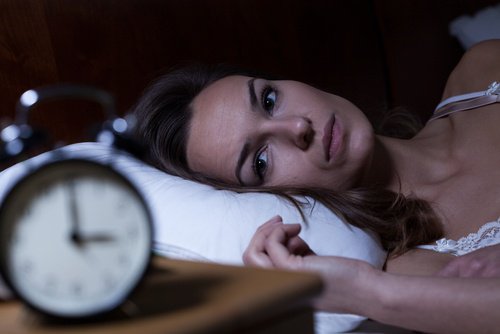Factors that Affect the Quality of Your Rest


Written and verified by psychologist Valeria Sabater
When you start suffering from any problem associated with the quality of your rest at night, the first thing any specialist will ask is what your daily habits are.
Having a poor diet, staying up late, taking too many naps, or abusing your computer and mobile device when you should be sleeping can undoubtedly trigger insomnia.
However, something else to keep in mind is that you’re not the only one responsible for getting poor rest.
Sometimes, despite sleeping at night, the quality of your rest isn’t good enough; you wake up frequently, winding up tired in the morning with muscle pains and headaches.
If this is you, and the situation has continued for some time, you should see a doctor to identify the cause.
In this article, we want to discuss certain other factors that can be behind a bad night’s sleep. You might not even be aware when they happen.
Let’s take a look at them.
1. Your age affects the quality of your rest

As we get older, it’s common to experience some loss of quality sleep.
You might sleep lighter, wake up more often, and have fewer hours of deep sleep.
Over time, this occasional insomnia can become chronic, to the point of requiring some kind of medication that guarantees adequate rest and an improved quality of life overall.
The reasons for this are numerous. Some problems like sleep apnea, restless leg syndrome, joint pain, or even alterations to your circadian rhythm can appear.
Getting medical care, having a good diet, and exercising regularly can help improve the quality of your rest.
Also discover:
8 Foods to Fight Insomnia
2. You sleep less if you’re a woman
While it’s impossible to make generalizations because insomnia can appear when you least expect it, the American Sleep Foundation determined that your gender can affect your rest.
Here’s why:
- Women tend to multitask by performing a variety of activities in which their minds are aware of multiple pressures, stimuli, and responsibilities.
- In addition, any disorders associated with pregnancy or menopause may be present.
All of this can trigger the onset of insomnia.
Another interesting aspect is the fact that men have more problems with sleep apnea or snoring. This means that they wake their partners up on multiple occasions on average.
All of these characteristics mean that little by little, a woman’s quality of rest can decrease.
3. Culture and the place where you live

This fact is more than a mere curiosity. In reality, it’s related to something that everyone understands: the kind of society you live in can determine the quality of your well-being.
In certain places like Japan, where people are very work-oriented, society values getting fewer hours of sleep at night.
Actually, it’s even common for them to practice what’s known as “inemuri,” or the art of being awake while sleeping.
Japanese people may take small naps in their work spaces, nodding off briefly without ever going to bed.
This involves resting the mind and body for a few minutes in light of the significant work pressure that characterizes much of the population of this country.
On the other hand, lifestyle habits depend very much on the culture in which we belong.
In Spain, for example, it’s common to eat late and go to bed very late; it’s not like this for a lot of northern European countries and most of the United States.
All of these are factors don’t necessarily depend on the individual. However, they do determine your ability to get good quality sleep.
Also read:
4. Sunlight

Over time and without even noticing it, your biological cycle is no longer in sync with daylight. If you get to work when the sun hasn’t risen yet or go home late at night, this can seriously affect your rest.
This is something that can have a major impact on your life.
5. Social pressure
Many people will say that they’re in charge of their own lives and that societal pressure is in their control.
However, there are certain factors that we can’t always control.
Work, for example, can set your schedule as well as the environment itself: social and economic policies, calendars, obligations…
You are part of a machine from which you can never be totally free. This can determine your stress load to a greater or lesser degree.
Much of these social pressures affect your life in a myriad of ways, especially at the emotional level. This is why you can go through periods in which you have problems with insomnia.
To deal with these pressures, it’s important to maintain a balance between your leisure and your work time.

Caring for your own health and well-being is key to being able to sleep better and be free from worry when your head hits the pillow.
All cited sources were thoroughly reviewed by our team to ensure their quality, reliability, currency, and validity. The bibliography of this article was considered reliable and of academic or scientific accuracy.
- Hirshkowitz, M., Whiton, K., Albert, S. M., Alessi, C., Bruni, O., DonCarlos, L., … Adams Hillard, P. J. (2015). National sleep foundation’s sleep time duration recommendations: Methodology and results summary. Sleep Health. https://doi.org/10.1016/j.sleh.2014.12.010
- Iglowstein, I., Jenni, O. G., Molinari, L., & Largo, R. H. (2003). Sleep Duration From Infancy to Adolescence: Reference Values and Generational Trends. PEDIATRICS. https://doi.org/10.1007/BF02906651
- Harrington, J. M. (2001). Health effects of shift work and extended hours of work. Occupational and Environmental Medicine. https://doi.org/10.1136/oem.58.1.68
This text is provided for informational purposes only and does not replace consultation with a professional. If in doubt, consult your specialist.








